HO-LEE-SMOKES and pucker up.
It’s barely 24 hours later and what’s shaking out so far is pretty scary. Is the federal reserve ready to handle something of this magnitude? Janet Yellen? Forces are already in motion trying to mitigate some of the damage and panic sure to ensue when the financial markets and banks open Monday morning, but there’s turning out to be an awful lot of scrambling to CYA.
One top investment bank sent a note to clients advising what could happen if no buyers steps in, according to a transcription reviewed by The Post.
The note outlined how the FDIC is spending the weekend assessing the value of SVB’s assets. It will pay out up to $250,000 in insurance coverage for accounts at that level or below on Monday. The agency will also make a payment, called an advanced dividend, to uninsured depositors as quickly as possible.
“The rest may take anywhere from 60 days to 2 years to get paid out,” the note said, adding that companies waiting for payouts will find investors and lenders available to try to finance the amounts the FDIC says they will get. Ultimately SVB clients could get 80 to 90 cents for each dollar they had on deposit, but it could take years for that to happen.
And that may be too late for many small businesses with ties to the bank.
Uninsured – over $250K – investors “could” see 80-90¢ on the dollar. That’s a mighty big “could.”
In England, the new Bank of London was mulling a possible offer to buy SVB’s London branch, and not because it was a bargain. They’re thinking the British tech sector may go down with the ship if they don’t have a rescue plan in place.
Sky News has learnt that The Bank of London (TBOL), which recently raised funds at a valuation of over $1bn, is considering making an offer for SVB UK.
News of its interest comes hours after the Bank of England said it planned to use a bank insolvency procedure to take control of the British operation, which counts thousands of UK start-ups among its clients.
…On Saturday, dozens of early-stage companies were writing to Jeremy Hunt, the chancellor, to warn of “an existential threat to the UK tech sector”.
…”The majority of the most exciting and dynamic tech businesses bank with SVB and have no or limited diversity in where their deposits are held,” the draft letter said.
“This weekend the majority of us as tech founders are running numbers to see if we are potentially technically insolvent.
“The impact of this is far greater than our individual businesses.
“The Bank of England’s assessment that SVB going into administration would have limited impact on the UK economy displays a dangerous lack of understanding of the sector and the role it plays in the wider economy, both today and in the future.”
…”Many businesses will be sent into involuntary liquidation overnight,” they wrote.
Here in the States, the reach of the failure isn’t just depositors and tech companies. It’s online marketplaces like Etsy, that used their payment processing. Now those people can’t be paid for sales from the website. A toy store chain in New York City is begging people to come buy toys for 40% off using a special code, so they can at least generate some sort of cash flow, or they’ll go under.
…The venture capital-backed retailer Camp fired off an email Friday to customers, saying it was slashing prices and plans to use sales revenue to continue operating, after much of its cash was tied up in the second-biggest bank casualty in U.S. history.
“Unfortunately, we had most of our company’s cash assets at a bank which just collapsed. I’m sure you’ve heard the news,” co-founder Ben Kaufman said in an email to customers, according to CNN.
Kaufman asked customers to use the code “BANKRUN” to save 40% off all merchandise — a likely nod to the run on the bank that may have helped bring down the Silicon Valley lender. The company also said customers could pay full price, adding that would be appreciated.
Better drink up, Shriners, while you can. SVB was THE bank for the better part of the wineries in California…thousands of wineries.
The wine industry is facing an unprecedented financial crisis amid the fallout of Silicon Valley Bank, the leading bank for California wineries.
Silicon Valley Bank was closed Friday by the California Department of Financial Protection and Innovation after a bank run by its venture capital customers. For nearly 30 years, the bank has been the go-to financial institution for the California wine industry. But now, an estimated thousands of wineries are locked out of their Silicon Valley Bank accounts — and they don’t know if, or when, they’ll get access to their money.
Kendra Kawala, the co-founder of Maker, a Bay Area canned wine company, called the news “jarring” as Silicon Valley Bank has been “the gold standard within the wine industry.” When she started Maker four years ago, “it was almost a no-brainer who the right banking partner was.”
A new bank, the National Bank of Santa Clara, has been created by the Federal Deposit Insurance Corp. to hold the deposits and assets of Silicon Valley Bank, and it will begin operating by Monday. But only accounts that fall below $250,000 are insured by FDIC; any winery with funds above that will have to wait an undetermined amount of time to find out if the additional amount will be paid back, partially or in full.
Roku has $487M in cash in SVB. Well…had. At least they’d spread the love out.
…Nonetheless, Roku said it believed it would be able to meet its capital obligations for the “next twelve months and beyond” with its unaffected $1.4 billion in cash reserves at other “large financial institutions.”
Part of the problem, as my little brother the banker explained to me, is that after the 2008 meltdown, the number of banks in the country shrank exponentially. So, while 2008 was awful, there was enough give in the system for it to be absorbed – banks were left standing who could buy the assets of failed banks. That flex is no longer available. The number has shrunk, so when one goes, it’s going to hurt much worse, especially something on this unimaginable scale.
“Let them go” has a huge, completely reasonable and utterly understandable following.
Home Depot co-founder torches ‘woke’ Silicon Valley Bank collapse, warns recession may be here already
Banks are more concerned with ‘global warming’ than shareholder returns, Bernie Marcus argued…”I feel bad for all of these people that lost all their money in this woke bank. You know, it was more distressing to hear that the bank officials sold off their stock before this happened. It’s depressing to me. Who knows whether the Justice Department would go after them? They’re a woke company, so I guess not. And they’ll probably get away with it,” he said to host Neil Cavuto.
…”Instead of protecting the shareholders and their employees, they are more concerned about the social policies. And I think it’s probably a badly run bank. They’ve been there for a lot of years. It’s pathetic that so many people lost money that won’t get it back.”
If you had to give it a cover song, I guess “Won’t Get Fooled Again” would be the first choice of a majority.
My friend Gray is 100% right. We’ve seen this movie and the people involved rarely, if ever, give a flying cannoli when the shoe is on the other foot.
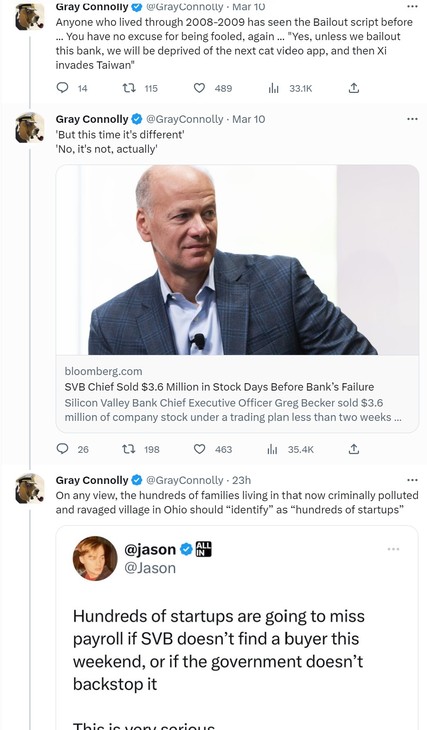
I saw some wag on Twitter coining “Learn to weld.” And had to laugh.
On the other hand, the venture capitalist crowd is already howling for action. Most of which, they say, should have been taken Friday afternoon.
…But the vast majority of SVB’s customers were businesses that had more than that on deposit at the bank. As of December, more than 95% of the bank’s deposits were uninsured, according to regulatory filings. Many of these depositors are startups, and many are concerned that they will not be able to make payroll this month, which in turn could spark a wide wave of failures and layoffs in the tech industry.
Investors are concerned that these failures could reduce confidence in the banking sector, particularly mid-sized banks with under $250 billion in deposits. These banks are not deemed “too big to fail” and do not have to undergo regular stress tests or other safety valve measures passed in the wake of the 2008 financial crisis.
Venture capitalist and former tech CEO David Sacks called for the federal government to push another bank to buy SVB’s assets, writing on Twitter, “Where is Powell? Where is Yellen? Stop this crisis NOW. Announce that all depositors will be safe. Place SVB with a Top 4 bank. Do this before Monday open or there will be contagion and the crisis will spread.”
VC Mark Suster agreed, tweeting, “I suspect this is what they’re working on. I expect statements by Sunday. We’ll see. I sure hope so or Monday will be brutal.”
This tweet is way long, but hugely informative from the VC side of things, arguing the government has 48 hours to get this squared away and what he sees as the consequences of inaction.
The gov’t has about 48 hours to fix a-soon-to-be-irreversible mistake. By allowing @SVB_Financial to fail without protecting all depositors, the world has woken up to what an uninsured deposit is — an unsecured illiquid claim on a failed bank. Absent @jpmorgan @citi or… https://t.co/SqdkFK7Fld
— Bill Ackman (@BillAckman) March 11, 2023
A snippet of it below:
…Had the gov’t stepped in on Friday to guarantee SVB’s deposits (in exchange for penny warrants which would have wiped out the substantial majority of its equity value) this could have been avoided and SVB’s 40-year franchise value could have been preserved and transferred to a new owner in exchange for an equity injection. We would have been open to participating. This approach would have minimized the risk of any gov’t losses, and created the potential for substantial profits from the rescue. Instead, I think it is now unlikely any buyer will emerge to acquire the failed bank. The gov’t’s approach has guaranteed that more risk will be concentrated in the SIBs at the expense of other banks, which itself creates more systemic risk.
When he talks about “systemically important banks” (SIBs), he’s talking about financial institutions whose failure might cause a financial crisis – your J.P. Morgan, Citigroup, etc. There is actually a list of these banks. What I believe he’s saying in this tweet is that if the government doesn’t come through on the uninsured side of the house for the SVB depositors, every regional bank will have those funds pulled out -“that sucking sound” – and deposited in SIBs or “too big to fail” institutions for protection.
[Clarification: In this venture capital scenario] Your regional banking system will collapse. Signs of that are already surfacing on the West Coast.
the Fed removed Reserve Requirements for banks during the pandemic. And have not reinstated them. Normally reserve requirement is 10%. Meaning that the Federal Reserve is not requiring banks to hold cash reserves right now. Monday is gonna be bad, remember toilet paper hoarding
— the1stMikeC (@the1stMikeC) March 12, 2023
More along that line (GSIB is a global systemically important bank):
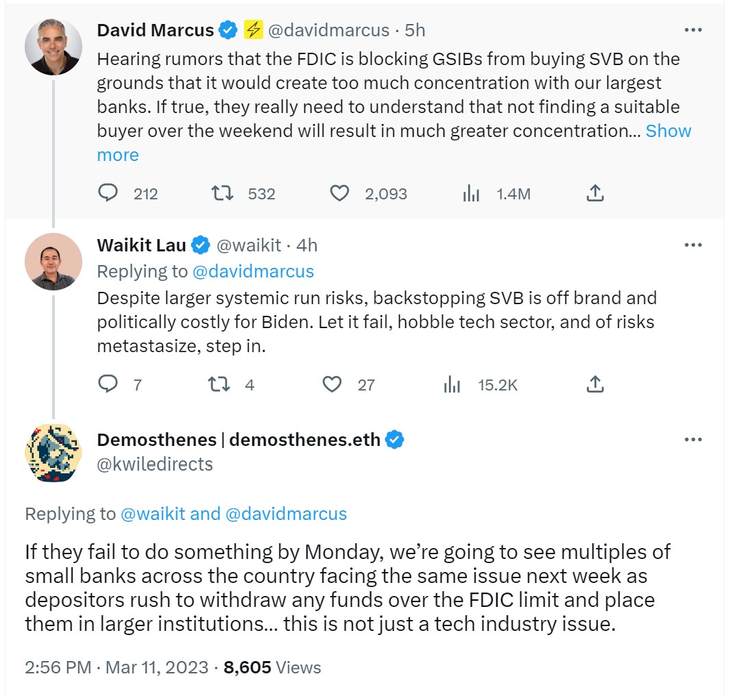
So here the Fed, FDIC and Treasury are, balanced on the edge of a knife – what do they do? The arguments on both sides – let it fail, or bail it out – are both exceptionally strong.
How about the people on whose watch this happened?
Well, looks like they knew damn well what was coming. For one, the head honchos sold their SVB stock…
Before the collapse of Silicon Valley Bank, $SIVB, the CEO sold $3.57 million of stock within the last two weeks.
This was part of their trading plans.
Gregory Becker, CEO, sold 11% on Feb 27, 2023.
Michael Zucker, General Counsel, 19% on Feb 5.
Daniel Beck, CFO, sold 32% on Feb 27.
Michelle Draper, CMO, sold 25% on Feb 1.
…and they made sure they paid out all the annual bonuses hours before the feds took them over.
Silicon Valley Bank on Friday paid out annual bonuses to eligible U.S. employees, just hours before the bank was seized by the U.S. government, Axios has learned from multiple sources.
What to know: The bonuses were for work done during 2022, and were previously scheduled to be disbursed on March 10. That date ultimately coincided with the bank’s takeover by the Federal Deposit Insurance Corporation.
Yeah, right. This guy is something else.
The squishy, emotional, barren-of-facts video from SVB’s CEO tells you exactly why it failed. pic.twitter.com/98nKUHLCAz
— Justin Hart (@justin_hart) March 11, 2023
Up to the bank’s collapse Friday, he was on the board of directors for the San Francisco Fed. Really.
The chief executive officer of failed Silicon Valley Bank, Greg Becker, is no longer on the board of directors at the Federal Reserve Bank of San Francisco.
Becker’s departure was effective on Friday, a spokesperson for the Federal Reserve said. Earlier on Friday, Silicon Valley Bank was closed by regulators.
The spokesperson declined to say how Becker exited the San Francisco Fed board. Becker served as a Class A director at the San Francisco Fed, one of three finance executives representing member banks in the San Francisco Fed district.
Guess they yanked his club card.
It also turns out that in 2015, he’d lobbied Congress to loosen up oversight of his little bank after it reached a certain threshold that normally triggered increased scrutiny. He wanted the limit raised from $50B to $250B before they had to comply. His argument was basically that they knew what they were doing, so why not leave well enough alone?
…Becker told Congress about ‘SVB’s deep understanding of the markets it serves, our strong risk management practices.’
He argued that his bank would soon reach $50 billion in assets, which under the law would trigger ‘enhanced prudential standards,’ including more stringent regulations, stress tests, and capital requirements for his and other similarly sized banks.
…’Given the low risk profile of our activities and business model, such a result would stifle our ability to provide credit to our clients without any meaningful corresponding reduction in risk.’
The lobbying paid off in 2019.
The Federal Reserve proposed regulations implementing the deregulatory law – despite warnings from financial watchdogs that its regulations on Category IV institutions — as SVB was later classified due to its size and other risk factors — were far too weak.
‘The proposal to significantly weaken enhanced prudential standards for Category IV firms could be disastrous,’ Better Markets, a nonprofit advocating for stricter financial regulations, wrote in a comment on the Federal Reserve’s proposal.
‘Moreover, these are not small or insignificant firms. Recall that the smallest among this class of banks is over twice the size of the $50 billion dollar banks that automatically required enhanced prudential regulation under the Dodd-Frank Act as originally enacted.’
He also kept the bank’s assets below the $250B threshold, so they never had to comply with the more stringent oversight regulations. Slick, no?
DISASTROUS
Yup. Pretty much was.
Supposedly the FDIC and Federal Reserve are in talks about a plan to “backstop” SVB. Bailout debates will be going on all weekend. The more that comes out about the people running this disaster, the harder it is going to be to convince your average American it needs saving, any of it, and consequences be damned.
Not one of these people, depositors or otherwise, could point to East Palestine on a map less mind gives a Flying Wallenda – if not actually wishes them ill for being Trump voters – and everyone knows it.
…That could lead to a backlash, in an echo of the fury directed at government rescue measures for Wall Street during the 2008 financial crisis. But this time taxpayers would be bailing out the would-be lords of tech rather than the lords of finance.
Another possibility is that larger Wall Street banks, fearing wider contagion, acquire what’s left of SVB and make all of its depositors whole. That could be a tricky bet, however, and bigger banks might ask for the federal government’s help before agreeing to a potentially unprofitable purchase.
“All the choices are bad choices,” said Simon Johnson, an economist at MIT who previously served as chief economist of the International Monetary Fund. “You don’t want to extend this kind of bailout to people. But if you aren’t doing that, you face a run of really big — and really hard to predict — proportions.”
Well. Have to wait and see what news and roosting chickens the coming hours bring.
While I completely understand the ramifications of letting this miserable, arrogant, and thoroughly corrupt group of pretentious cretins crash and burn, my sympathy meter is pretty much pegged. Then again, I’m a welding class kinda gal by nature.
****************
UPDATE: Alrighty. On “Face the Nation” this morning, Secretary of the Treasury Janet Yellen has said there will be no government bail-out.
After regulators shuttered Silicon Valley Bank and seized its deposits Friday, U.S. Treasury Secretary Janet Yellen said Sunday that she has been working “to address the situation in a timely way,” but that a major government bailout is not on the table.
“Let me be clear that during the financial crisis, there were investors and owners of systemic large banks that were bailed out, and the reforms that have been put in place means that we’re not going to do that again,” Yellen told CBS’ “Face the Nation.” “But we are concerned about depositors and are focused on trying to meet their needs.”
The FDIC and concerned parties are trying to find a buyer.
…Yellen said regulators are considering a wide range of options for SVB, including acquisitions.
“This is really a decision for the FDIC, as it decides on what the best course is to resolve this firm,” Yellen said.
Former FDIC Chair Sheila Bair said Sunday that finding a buyer for SVB is “the best outcome.”
“The problem is this was a liquidity failure, it was a bank run, so they didn’t have time to prepare to market the bank,” Bair told NBC’s “Meet the Press.” “They’re having to do that now and playing catch up.”
Yellen said they are concerned about “meeting the needs of depositers“…
…Treasury Secretary Janet Yellen said Sunday that the federal government will not bail out Silicon Valley Bank (SVB) but will help to try to meet the “needs” of depositors who stand to lose millions after the bank collapsed last week.
The Federal Deposit Insurance Corporation (FDIC) insures deposits up to $250,000, but many of the companies and individual customers who used the bank had much more than that in their account. Yellen signaled on CBS’ “Face the Nation” that government bailouts like those from the 2008 financial crisis would not be considered but that she expected regulators to weigh “a wide range of available options” for protecting those depositors.
“We’re not going to do that again,” Yellen said. “But we are concerned about depositors, and we’re focused on trying to meet their needs.”
“I’ve been working all weekend with our banking regulators to design appropriate policies to address this situation,” she said. “I can’t really provide further details at this time, but I really want to emphasize that the American banking system is really safe and well capitalized. It’s resilient.”
…and assuring Americans and the world that there would not be a domino effect from SVB’s collapse.
UPDATE REDUX: There’s an auction underway trying to unload SVB.
Federal regulators are conducting an auction for Silicon Valley Bank, with final bids due Sunday, according to a report from Bloomberg News.
The bank was closed by regulators on Friday after massive withdrawals a day earlier created a bank run. The Federal Deposit Insurance Corporation took control of the bank on Friday, and started an auction process on Saturday night, according to the report.
It is still possible that no deal is reached, the report said.
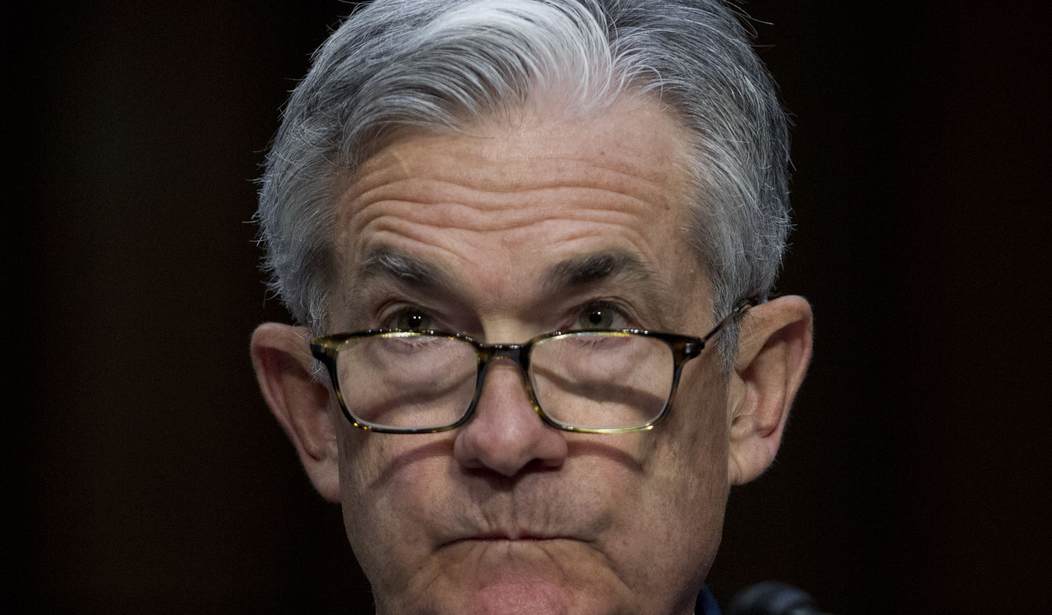



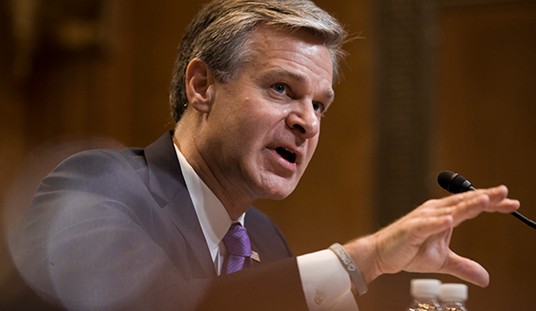

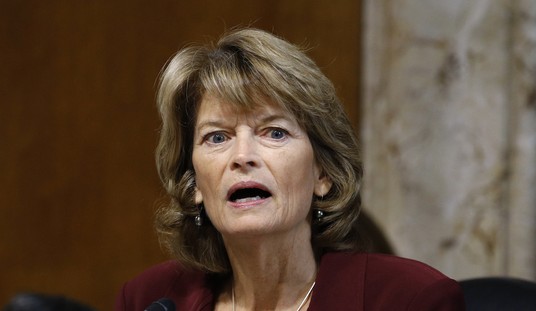
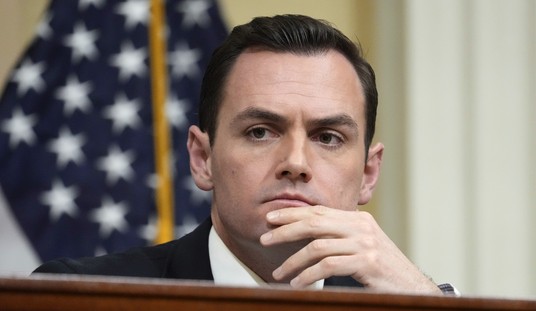
Join the conversation as a VIP Member